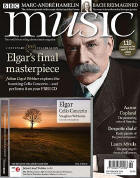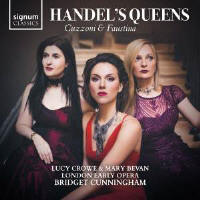Texte paru dans: / Appeared in: |
|
|
Appréciation d'ensemble / Overall evaluation :
|
|
|
Reviewer: Berta Joncus In this recording, conductor Bridget Cunningham explores the legend of Baroque star sopranos Cuzzoni and Faustina, as did Andrés Gabett in 2014. Unlike Gabett, however, Cunningham gets the Cuzzonifaustina story right. For centuries, music entrepreneurs have lured audiences by faking jealousy between celebrity female singers. While Handel only occasionally perpetuated this trope, Gabett based his whole programme on it. In a refreshing correction, Cunningham shows that Cuzzoni and Faustina weren’t rivals at all, but collaborative artists who complemented each other, not least when singing side by side. Lucy Crowe and Mary Bevan here recreate the two prime donne through their own blazing talents. Cunningham digs deep into the Cuzzoni-faustina legacy, bringing to light previously unrecorded works and tailoring music to suit her sopranos. Cuzzoni was idolised for her pure tone, translucent timbre, nobility of line, and steely diminutions; all these distinguish Crowe’s artistry, and Crowe runs with the Cuzzoni practices embedded in her scores. In ‘False immagine’ – a signature Cuzzoni number from Handel’s Ottone – Crowe treats a naked melody with wrenching directness, trailing off at verse ends as if groping for words. She leaps registers with careless abandon, most dazzlingly in ‘Quel nome se ascolta’ by Leonardo Leo. To the Cuzzoni pyrotechnics Handel featured in ‘Il volo così fido al dolce’ from Riccardo Primo, Crowe adds her own muscle, vaulting to trill on a high B flat in her cadenza. Bevan, as Faustina, matches Crowe’s intensity. Audiences adored Faustina for her fire, the athleticism of her runs and leaps and the richness of her colours, all of which Bevan commands; she tops up the decorations, abrupt stops and darting intervals written out for Faustina with her own. So, while she is expanding her material, Bevan condenses each aria’s passion, giving it weight, outline and character, not just in Handel favourites like ‘Gelosia, spetata aletto’ from Admeto, but also in arias by Hasse, Torri and Porpora. Duets illuminate the vocal qualities that period critics say made Cuzzoni and Faustina the perfect dyad. In the cut and thrust of this music, Crowe and Bevan bring out the differences between their voices: airiness Crowe and Bevan recreate the two prime donne through their own blazing talents versus sultriness, transparency versus richness, weightless versus embodied sound. Cunningham and London Early Opera offer optimal accompaniment: breathless silences into which Crowe drops her shining notes, a crisp stride underneath Bevan’s perorations, fragile siciliano accompaniment as a foil to Crowe’s swelling assurance and, in duets, a respectful retreat. When Crowe and Bevan’s improvisation goes bonkers, the band indulges their wildest musical fancies. While Handel has never sounded better, a distinction of this recording is the quantity and quality of its non-handelian music, some previously lost and premiered here. Together, Crowe, Bevan and Cunningham have reclaimed these masterworks.
| |
|
|
|
|
|
|
|
Cliquez l'un ou l'autre
bouton pour découvrir bien d'autres critiques de CD |
|




